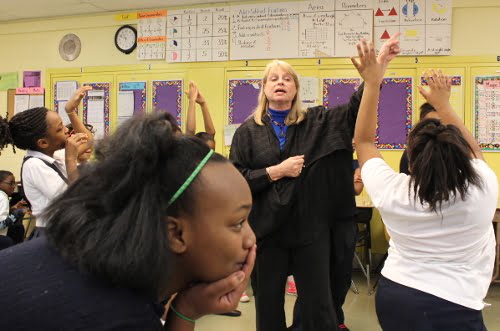We all like lists. Everyone is familiar with "top 10" lists, so we thought we'd put one together. Here you go: Top 10 reasons why drama or theater works for teaching character education:
-
Establishes a sense of safety. Young people need a place to experience how the actions of one person might affect the reactions of another person.
-
Transmits societal values. Societies survive and thrive by transmitting its values to the present and next generations. Through plays and stories of people past and present, we transmit the way humans should shape their lives. Through viewing plays, students see the actions of humans carried out. Through performance students experience the moments.
-
Teaches moral lessons through story. If little time is spent at home in the teaching of moral behavior, drama in the classroom provides the students with an opportunity to experience lessons captured in stories.
-
Presents universal moral and ethical themes. Through the enacted stories of people past and present, educators can pave a universal avenue to themes that support ethical and moral choices. Providing clear dramatic examples, lived through dramatic enactment, set a standard for young people even in our value conflicted society.
-
Allows students to practice making ethical choices in adult guided situations. To sustain a democracy, people need to make good moral and ethical choices. Young people need to practice and discuss these choices in adult guided situations.
-
Enacting stories has a greater impact than merely reading. No story is free from communicating values, ethical decisions, or showing moral living. When the stories are enacted, they have a greater impact because the students are active in problem solving, relating situations to their own lives, and walking for a moment in the shoes of someone else – seeing the world from a different perspective.
-
The great stories and the great dramas are based on these essential ethical questions: “How shall I live my life?” “How shall I get along with others?” “How do I do the right thing in the midst of so much pressure?” “Why should I lead a good moral life?”
-
There is growing need for more avenues to teach character education in the schools.
-
Creates future artists who will communicate values. The artists of the future, those who will create the stories for the next generations, need to experience how values are shared through story.
-
The art form is based on characters in conflict with a problem to resolve. How and why a character does what they do, is fertile ground for the study of good character trait development – it is a deeper study of motivation.
You can download this top ten list as a PDF.
We posted a new lesson series in the DRAMAShop on character education and peaceful problem solving. These lessons apply techniques from drama to demonstrate what makes each person special and how emotions drive our actions. These lessons are available to members -- JOIN to download them today!

